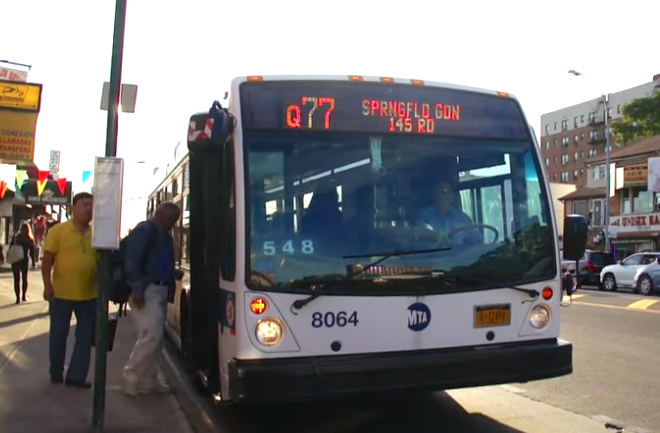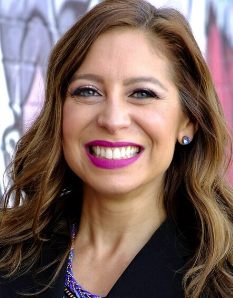Several candidates are challenging Assembly Member Michael DenDekker for a Queens seat covering parts of Woodside, Jackson Heights and Corona [map]. Today, we present two op-eds from challengers, Jessica González-Rojas and Nuala O'Doherty-Naranjo, in hopes of spurring a vigorous discussion of one of the most important issues facing the district: transportation. Here is González-Rojas's piece. O'Doherty-Naranjo's can be read here.
The Metropolitan Transportation Authority last week suspended fare collection on all local bus routes, in order to keep drivers and riders a safe distance from each other during the coronavirus pandemic. It’s a practice that we should make permanent — and extend to all transit — but the buses are a good place to start.
Why? The buses are a proven way to help the most disadvantaged New Yorkers. As is well known, the buses are the transportation mode used most heavily by the poorest communities. Moreover — and this is an often neglected point — the buses are the only fully accessible fleet for people with disabilities.
I am running for New York State Assembly on a platform of making mass transit free and our streets safer. Even before the outbreak, I advocated for fare-free buses because universally accessible mass transit is critical for improving mobility, safety, equity, and air quality for all New Yorkers. What started as an emergency measure for social distancing should become a permanent feature of our social landscape — for reasons make more sense than ever.
Climate, traffic congestion and public health: We urgently need to bolster sustainable transportation options as we face the challenges of climate change. That means removing cars from our streets in favor of much-more-efficient buses, relieving traffic congestion. When you relieve congestion, you drive down carbon emissions and, with them, rates of asthma — an "underlying condition" that plagues our poor communities even in the best of times and that has gained heightened salience in the pandemic. We can make buses a more attractive option for everyone by removing the cost-barrier.
Efficiency: Revenue collection on buses is a waste of time and money. Passengers waiting in line to board and pay slow down the bus and defeat the purpose of a faster commute. (Waiting in packed lines also allow more time for germs to spread, as we have learned with this disease.) The costs associated with collecting and accounting for fares is not worth the capital costs of fare boxes, the labor time of bus drivers, or money spent on counting equipment and facilities. Bus operators regularly cover fare boxes to move passenger boarding along more quickly, and “fare evasion” happens more frequently on buses than in the subways. Let’s remove this economic barrier to a more efficient system.
Equity: We, as a society, pay for public schools because we understand that education is a human right and an investment in our future. We pay for public parks because they improve health and quality of life enough to be worth the money we spend on them. We pay for roads and bridges because the ability to transport goods and people quickly is objectively valuable and generates economic growth.
Why is mass transit treated any differently? We must recognize that charging low-income New Yorkers to use mass transit is a regressive tax on poor people and is ultimately counterproductive. At times, it appears to be a matter of racial justice.
Are transit users forced to pay fares because the majority of riders are low-income or people of color? We don’t charge fares for the Staten Island Ferry, which carries 75,000 passengers a day. Is that because Staten Island is the borough with the largest white population per capita?
Earlier this year, when the MTA announced a proposal to redesign the Queens bus network, I joined my neighbors in opposing this misguided idea, which would have eliminated many heavily used routes in immigrant communities like mine, including Jackson Heights, Corona, East Elmhurst, and Woodside.
The MTA was trying to remove bus lines and cut service in order to produce revenue-neutral changes. We must operate a mass-transit system that looks at the value it provides to people, not the profits it generates.
We all agree that mass transit is an essential part of our lives as New Yorkers. Mass transit is already heavily subsidized by taxpayers; we should push to have it fully subsidized like schools, libraries, and parks. Providing the community with an efficient means of mobility is a public good; it is a worthy investment for our mobility, safety, and sustainability. It is not a free ride for New Yorkers.
Even after we get through this pandemic, we should keep the MTA buses free.
Jessica González-Rojas (@votejgr) is a transit and reproductive-health activist who is running in the Democrat primary for State Assembly in the 34th District.







